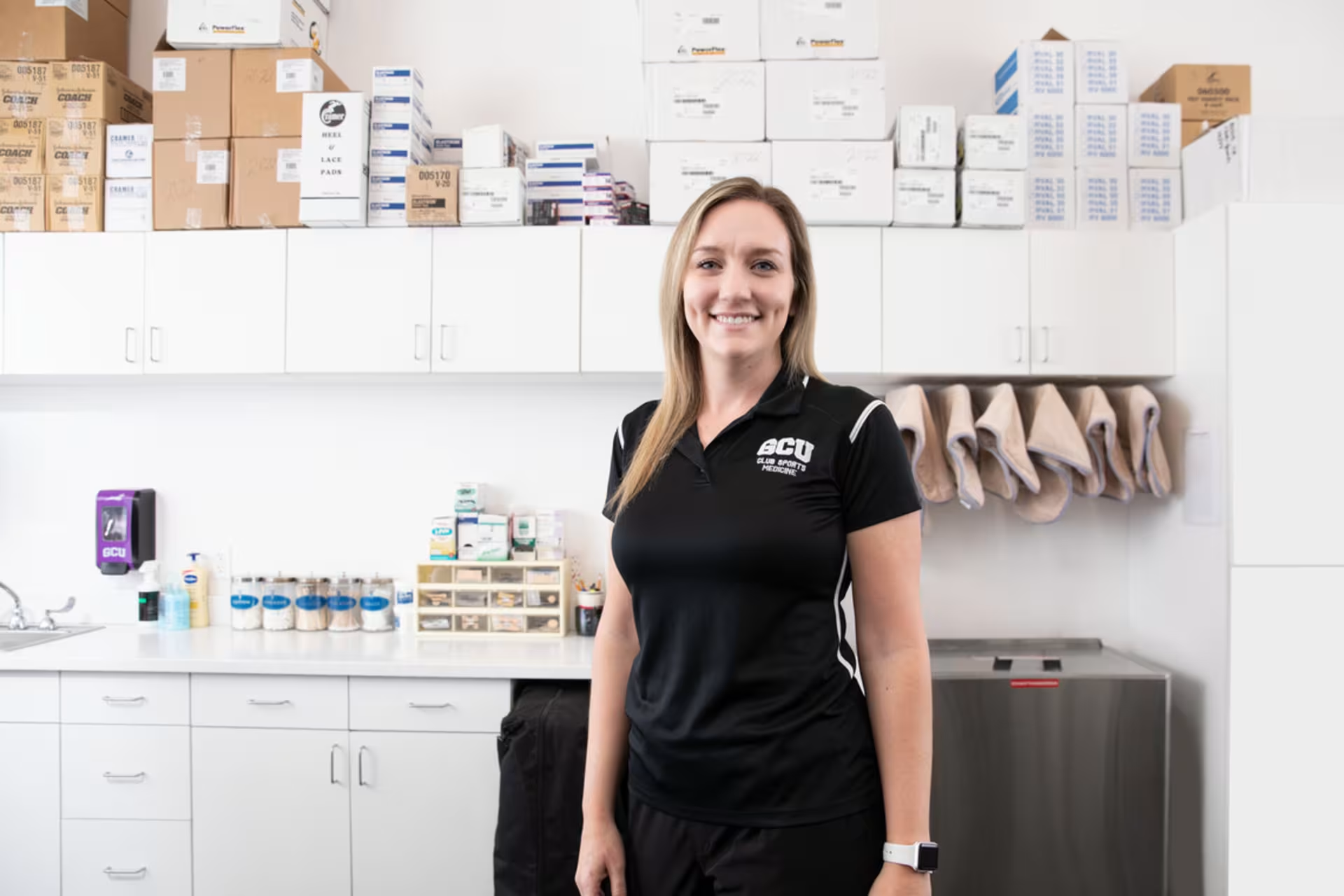
Online Master’s in Occupational Therapy (MSOT) Degree
Empower Individuals To Thrive With Improved Health and Well-Being
The Master of Science in Occupational Therapy from GCU focuses on teaching aspiring occupational therapists to become competent, client-centered practitioners. Through a curriculum that is evidence-based, academic and clinical, you will take courses that focus on teaching you critical thinking and the application of best practices. You will work to develop the knowledge and skills required to help improve the health, independence and quality of life of your clients through implementing scientific practices.
This MSOT degree is designed to help prepare you to take the National Board for Certification in Occupational Therapy (NBCOT) exam. You will be eligible to work as a registered occupational therapist upon passing the exam and obtaining state licensure.
Annual median salary for occupational therapists as of May 2024(See disclaimer 2)
Online: $750 per credit [More Info]
Up to 12 credits or 1/3 of the total program requirements in transfer (whichever is less)
Credits: Fill out the Lopes Eval to find out what will transfer
Admission requirements may differ based on degree level, program and modality or transfer status. Some programs of study may require a higher GPA and/or other qualifying criteria for admission.
Please review full admission and program requirements in the University Policy Handbook.

Study Occupational Therapy Courses Online
At GCU, you have the opportunity to embrace flexibility and convenience as you complete your occupational therapy master’s courses online.(See disclaimer 1) We offer all learners a variety of online support resources, along with an intuitive learning platform designed to deliver top-tier education from a distance.
Master of Science in Occupational Therapy Coursework
This graduate program will teach you relevant course material that is applicable to occupational therapy practice and critical to OT work. Course topics covered in this program include:
You will also be required to complete on-campus experiences in your program. These immersive sessions provide valuable hands-on learning that allows you to apply your studies in practical contexts. They are designed to strengthen your understanding of essential skills and prepare you to work confidently across diverse practice settings with individuals of all ages and backgrounds.
Master’s in OT students are also required to complete full-time Level II fieldwork. This immersive clinical experience is a vital part of your preparation, giving you the opportunity to work under the guidance of licensed occupational therapists while advancing your skills in assessment, intervention and documentation.
Career Paths for Occupational Therapy Master's Degree Graduates
The goal of GCU’s MSOT degree is to graduate educated, well-rounded students who have gained the knowledge and skills needed to make a difference in the lives of their clients as occupational therapists. Because you must pass the NBCOT exam to become a certified OT, we incorporate NBCOT exam prep into our curriculum to help you feel prepared and confident going into your exam.
Some occupational therapists may specialize, choosing to work in areas such as pediatrics or geriatrics. Through combining practical experience with NBCOT preparation, you can feel prepared to embrace any environment and tackle challenges with confidence.
Occupational therapists can work in a variety of practice settings, including:
Hospitals
Outpatient clinics
Skilled nursing facilities
Home health
Schools & pediatrics
Mental health settings
Community-based programs
Work and industry
Emerging practice areas
Earn Your Master’s in OT From an Accredited University
The entry-level occupational therapy master’s degree program has applied for accreditation and has been granted Candidacy Status by the Accreditation Council for Occupational Therapy Education (ACOTE) of the American Occupational Therapy Association (AOTA), located at 7501 Wisconsin Avenue, Suite 510E, Bethesda, MD 20814. ACOTE’s telephone number c/o AOTA is (301) 652-6611 and its web address is www.acoteonline.org. The program must have a preaccreditation review, complete an on-site evaluation, and be granted Accreditation Status before its graduates will be eligible to sit for the national certification examination for the occupational therapist administered by the National Board for Certification in Occupational Therapy (NBCOT). After successful completion of this exam, the individual will be an Occupational Therapist, Registered (OTR). In addition, all states require licensure to practice; however, state licenses are usually based on the results of the NBCOT Certification Examination. Note that a felony conviction may affect a graduate’s ability to sit for the NBCOT certification examination or attain state licensure.
In addition, GCU is institutionally accredited by the Higher Learning Commission.
Frequently Asked Questions
When deciding whether to pursue a career in occupational therapy, you may have additional questions that can ultimately help you make your decision. Read through some of our commonly asked questions to gain more insight into this career path.
How do I become an occupational therapist?
What's the difference between occupational therapy and physical therapy?
Is occupational therapy a good career?
Program Curriculum
Core Courses

Begin your journey toward a meaningful future in occupational therapy and help others thrive.
- Excluding required on-campus experiences and fieldwork.
- The earnings referenced were reported by the U.S. Bureau of Labor Statistics (“BLS”), Occupational Therapists, as of May 2024, retrieved September 2025. Due to COVID-19, data from 2020 to 2023 may be atypical compared to prior years. BLS calculates the median using salaries of workers nationwide with varying levels of education and experience. It does not reflect the earnings of GCU graduates as occupational therapists, nor does it reflect the earnings of workers in one city or region of the country or a typical entry-level salary. Median income is the statistical midpoint for the range of salaries in a specific occupation. It is very unlikely that a median salary will reflect an entry-level salary. It represents what you would earn if you were paid more money than half the workers in an occupation, and less than half the workers in an occupation. It may give you a basis to estimate what you might earn at some point if you enter this career. Grand Canyon University can make no guarantees on individual graduates’ salaries. Your employability will be determined by numerous factors over which GCU has no control, such as the employer the graduate chooses to apply to, the graduate’s experience level, individual characteristics, skills, etc., against a pool of candidates.
- COVID-19 has adversely affected the global economy and data from 2020 to 2023 may be atypical compared to prior years. Accordingly, data shown is effective August 2025, which can be found here: U.S. Bureau of Labor Statistics, Occupational Outlook Handbook, Occupational Therapists, retrieved September 2025.


